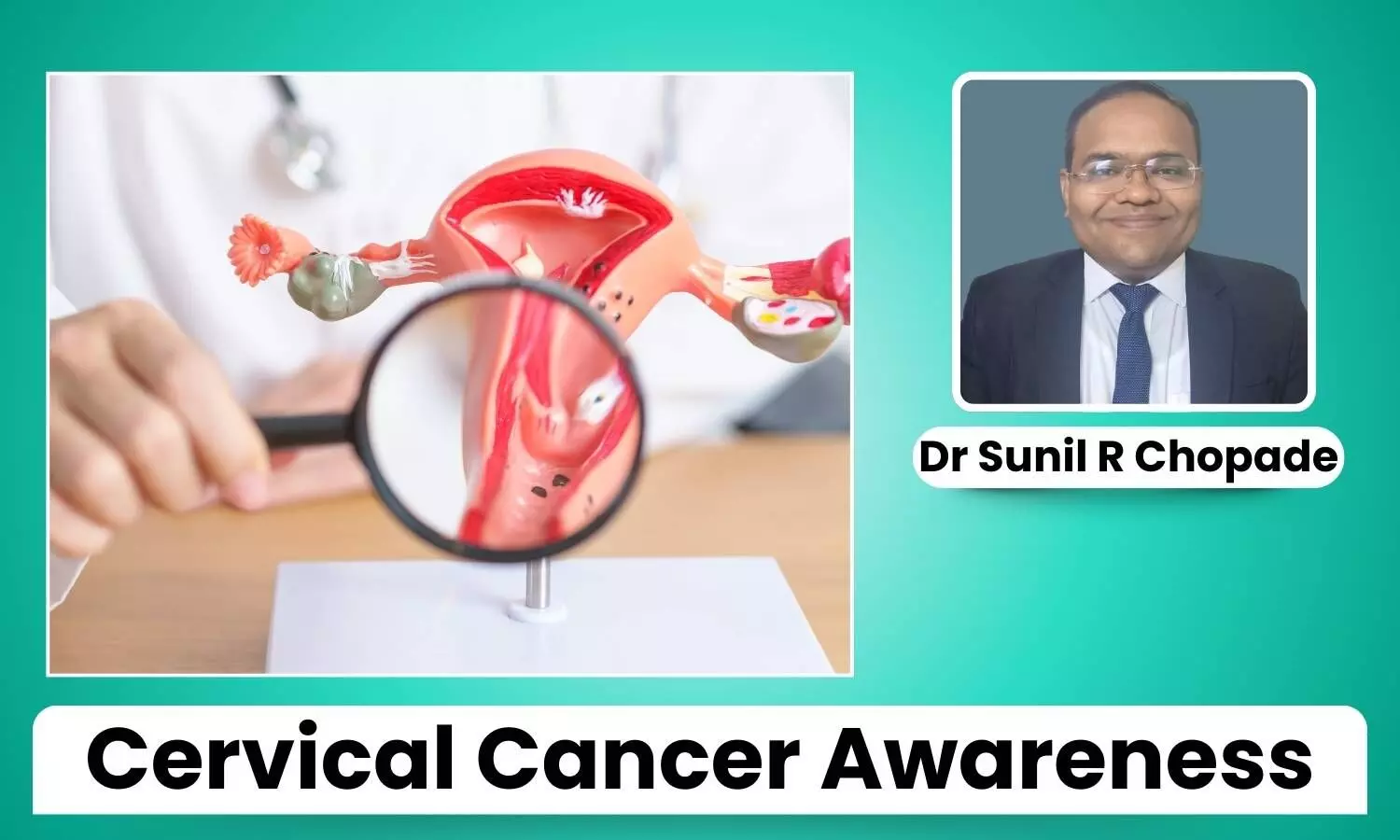Cervical Cancer Awareness: Key Facts, Prevention Tips, and Screening Guidelines You Must Know - Dr Sunil R Chopade

Cervical cancer is the fourth most common cancer in females worldwide according to GLOBOCAN 2020 data. January is marked as cervical cancer awareness month.
It is one of the most prevalent cancers in the females in India, being the leading cause of cancer deaths. Almost 70-80 % of this are caused by Human Papilloma Virus, a sexually transmitted infection.
The cervix is the lowest part of the uterus (where a baby grows during pregnancy). It looks a little bit like a donut and connects the uterus to the opening of the vagina. Cervical cancer happens when normal cells of cervix turns into precancerous cells. Cervical cancer can begin at the age of 25 and can happen thereafter 40-50 being common age.
Causes of Cervical Cancer
Almost all cervical cancers are caused by HPV, which is transmitted by sexual contact and almost preventable. Early onset sexual activities, having multiple sexual partners, poor hygiene, having low immunity due to other illness like HIV increase the risk of getting HPV infection and developing cervical cancer.
Excessive smoking and obesity may pose as risk factor. Not taking HPV vaccination remains a common cause for the increasing risk of cervical cancer.
Symptoms and Signs of Cervical Cancer
Key symptoms and signs include:
• Vaginal bleeding between periods
• Menstrual bleeding that is longer or heavier than usual
• Pain during intercourse
• Bleeding after intercourse
• Pelvic pain
• Changes in vaginal discharge, such as increased discharge or an unusual colour or smell
• Vaginal bleeding after menopause
Females with symptoms should consult doctors and do the needful tests as advised by your doctor.
Diagnosis of Cervical Cancer
The diagnosis of cervical cancer is confirmed through the examination of cervical tissue. Key diagnostic methods include:
• Cytology (PAP smear): Detects precancerous and cancerous cells.
• Biopsy: Involves taking tissue samples for examination by a pathologist.
• Imaging Tests: CT scans, MRI, and PET-CT scans help determine the size, extent, and spread of the tumour.
Treatment of Cervical Cancer
Treatment depends on the stage of the tumour:
• Early-Stage Cancer: Can be cured with surgery or chemo-radiotherapy.
• Advanced-Stage Cancer: Managed with chemotherapy, targeted therapy, and immunotherapy. The primary goal in advanced stages is symptom control and life prolongation.
Prevention of Cervical Cancer
Prevention is always better than cure. The same dictum applies to cervical cancer too.
Preventive Methods:
1. Community Education: Promote awareness about safe sexual practices.
2. Quit Smoking: Reducing tobacco use lowers cancer risk.
3. Screening: Regular cancer screening through PAP smears.
4. HPV Vaccination: A key measure in preventing HPV infection and cervical cancer.
Cervical Cancer Screening
• PAP Smear: Cervical cancer screening by PAP smear (Papanicolaou test) and HPV testing if available. Various studies showed that cervical cancer screening reduces the risk of early cancer by 70-80% and invasive cancer by 50%.
It is recommended to do PAP smear test every five year for women of reproductive age beginning at the age of 25 year.
• WHO Recommendations: WHO has recommended minimum one adequate smear per lifetime for women aged more than 35 year or 3 smear per lifetime with 10 year interval between each smear beginning not earlier than 30 years of age.
HPV Prevention and Vaccination
HPV is a sexually transmitted disease. Safe sexual activities using barrier methods like condoms, avoiding direct contact and PAP smear testing can prevent transmission of HPV.
HPV Vaccine is the most effective method of preventing infection and occurrence of cervical cancer. Gardasil (Tetravalent), Cervarix (Bivalent) and Nonavalent HPV vaccines are available in India.
Recommended Schedule:
• Girls aged 9–14: Two doses, six months apart, before exposure to HPV through sexual contact.
• Girls aged 16 and older: Three doses over six months
• Immunocompromised individuals: Three doses
Government health institutions are actively working to create awareness about HPV vaccination, its availability and implementation.
To conclude
Learn about cervical cancer, prevent it by early HPV vaccination and screen yourself for cervical cancer if you are in reproductive age group to fight this battle against cervical cancer.
Disclaimer: The views expressed in this article are of the author and not of Health Dialogues. The Editorial/Content team of Health Dialogues has not contributed to the writing/editing/packaging of this article.


